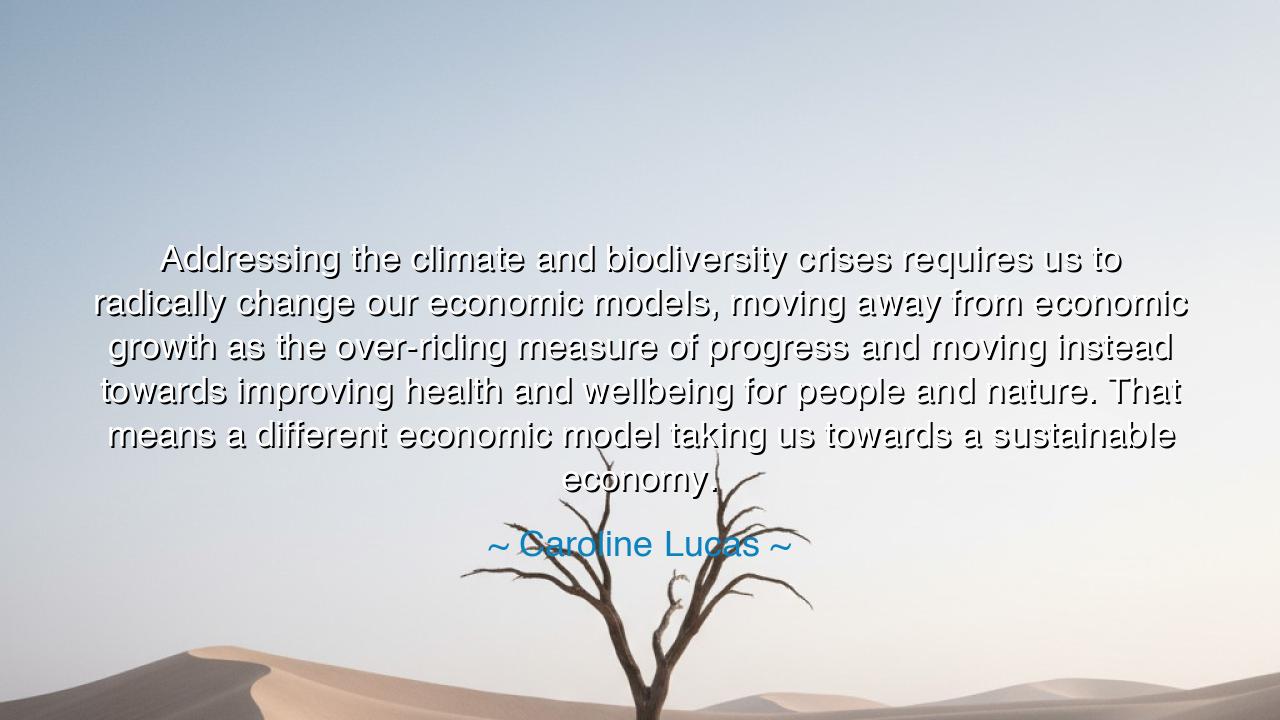
Addressing the climate and biodiversity crises requires us to
Addressing the climate and biodiversity crises requires us to radically change our economic models, moving away from economic growth as the over-riding measure of progress and moving instead towards improving health and wellbeing for people and nature. That means a different economic model taking us towards a sustainable economy.






“Addressing the climate and biodiversity crises requires us to radically change our economic models, moving away from economic growth as the over-riding measure of progress and moving instead towards improving health and wellbeing for people and nature. That means a different economic model taking us towards a sustainable economy.” Thus spoke Caroline Lucas, a guardian of the earth and a voice of conscience in a world that too often confuses wealth with wisdom. Her words are both warning and prophecy—a reminder that the true measure of civilization is not how much it produces, but how well it preserves the balance between humanity and nature. For when the soil grows weary and the waters grow poisoned, no riches can redeem what has been lost.
In these words lies a truth as ancient as the dawn: that growth without harmony is decay in disguise. The rulers of old knew that the harvest must never exceed what the land could bear. The Egyptians revered the flooding of the Nile, the source of their bounty, and offered prayers of gratitude, not conquest. The sages of the East taught that prosperity flows only where balance endures—between man and the elements, between taking and giving. But in our age, blinded by the pursuit of endless economic growth, we have severed this sacred balance. The earth groans beneath our weight; the forests fall, the seas rise, and the air thickens with our forgetfulness.
Caroline Lucas’s call is therefore not merely political, but moral and spiritual. She speaks to the heart of our civilization’s sickness: the belief that progress can be measured in numbers alone. Gross domestic product, profit, and consumption have become false idols, while health, wellbeing, and biodiversity—the true pillars of existence—are cast aside as unprofitable. Yet what use is an empire of gold if the rivers that once fed its people have run dry? What victory is there in abundance, if the soil can no longer yield life? Lucas urges us to redefine progress, to see success not as accumulation, but as sustainability, not as conquest, but as coexistence.
Consider the fall of Easter Island, that haunting lesson carved into the bones of history. The people who once dwelled there flourished, building great statues to honor their gods. But in their hunger for growth and prestige, they cut down every tree to move their monuments, until the land was bare, the soil eroded, and the birds vanished. Their society, once proud and prosperous, collapsed into famine and ruin. The story of Easter Island is the story of us all—a mirror held up by time, warning that no civilization can outlive the death of its ecosystem. And yet, unlike them, we have the knowledge and foresight to change our path, if only we have the courage to listen.
To move toward a sustainable economy, as Lucas implores, is not to forsake prosperity, but to redefine its purpose. A tree that grows endlessly will one day collapse under its own weight; so too must human enterprise learn the rhythm of the seasons—to rest, to renew, to restore. The economy of the future must honor both people and planet, valuing clean air, fertile soil, living oceans, and healthy communities as the truest forms of wealth. Such an economy would not measure success in coins, but in the flourishing of life; not in profit, but in peace. This is not utopia—it is survival elevated to wisdom.
The ancients spoke of stewardship—the sacred duty to care for the gifts of the earth so that future generations might inherit them unspoiled. This principle lives still, whispered in the forests and sung by the rivers. It is echoed in Lucas’s plea: to replace greed with gratitude, excess with equilibrium, and ignorance with reverence. The challenge before humanity is vast, yet the path is clear: heal the land, and it will heal us. Restore the forests, and our air will sweeten. Protect the seas, and they will sustain us. The wellbeing of humanity and nature are not separate destinies, but one shared heartbeat.
So, my child, take this teaching as both commandment and comfort: choose sustainability over speed, quality over quantity, balance over ambition. In your home, your work, and your community, live as though the earth were sacred—because it is. Plant trees that you may never sit beneath. Support those who build a fair and living economy. Speak for the voiceless—the rivers, the forests, the creatures whose fate is tied to ours. For the day will come when mankind will be judged not by its monuments of steel, but by the greenness of its fields and the purity of its air.
Let Caroline Lucas’s words echo in every heart: that the destiny of humanity is bound to the destiny of the Earth. Progress that destroys its foundation is not progress at all. The future belongs not to those who take the most, but to those who care the most. And when we finally understand that health, wellbeing, and balance are the true measures of greatness, we shall at last build a civilization worthy of the name.






AAdministratorAdministrator
Welcome, honored guests. Please leave a comment, we will respond soon